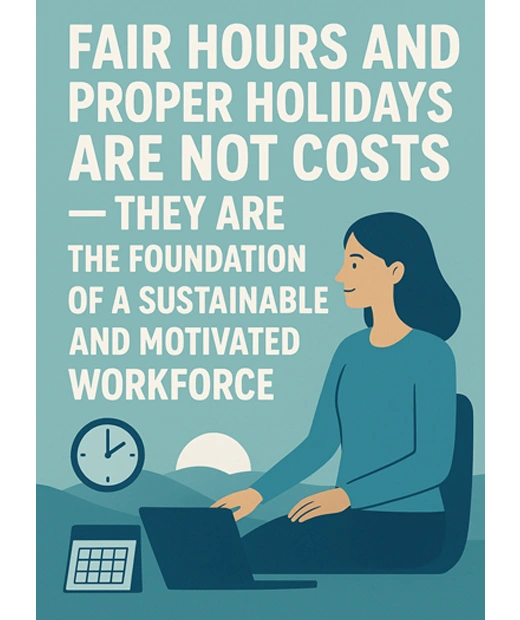Sri Lanka’s labour laws are designed to ensure fair working conditions, rest, and respect for employees’ wellbeing. Whether you work in a factory, an office, or a retail shop, your working hours, rest intervals, and holidays are protected by law.
The three key pieces of legislation governing this area are the Wages Board Ordinance of 1941, the Factories Ordinance of 1950, and the Shop and Office Employees (Regulation of Employment and Remuneration) Act of 1954.
This article explains which law applies to you, how working hours are regulated, what holiday benefits you’re entitled to, and how Sri Lankan employers ensure compliance in practice.
1. The Three Key Laws Governing Working Hours and Holidays
Sri Lanka’s framework for regulating working time and holidays comes from three main laws:
- 🏭 Factories Ordinance (1950): Governs manufacturing, charitable, and training establishments where manual labour is performed.
- 🛍️ Shop and Office Employees Act (1954): Covers employees in shops, offices, and service sectors.
- ⚖️ Wages Board Ordinance (1941): Applies to industries and trades listed under specific wage boards.
Each of these laws sets unique standards for working hours, rest breaks, and holiday entitlements, depending on the type of establishment.
2. Who Is Covered Under These Laws?
Determining which law applies depends on the nature of your workplace:
- Factories Ordinance: Applies to anyone engaged in manufacturing or manual processes — including repair, finishing, or adaptation of goods for sale.
- Shop and Office Employees Act: Applies to clerical, sales, and administrative staff.
- Wages Board Ordinance: Applies to workers in specific “trades” such as apparel, transport, hospitality, or tea plantations.
This distinction ensures that every worker — from a machine operator in a garment factory to an accountant in Colombo — has clearly defined working conditions.
3. Categories of Workers in Sri Lanka
Sri Lankan employment law recognizes several worker categories:
- Permanent Workers: Engaged continuously until retirement.
- Probationers: On a trial period (typically six months).
- Apprentices: Training in a trade for a defined period.
- Temporary/Seasonal Workers: Hired for short-term or seasonal projects.
- Contract Workers: Fixed-term roles with specific job descriptions and pay scales.
📘 In the public sector, employment is mostly permanent, with retirement typically at age 55.
📘 In the private sector, workers are often hired on fixed-term contracts with defined hours and benefits.
4. Standard Working Hours and Overtime Rules
Under the Wages Board Ordinance (1941):
- Normal work hours: 48 hours per week
- Overtime: Work exceeding 48 hours/week
- Maximum overtime: 12 hours per week
- Overtime pay: 1.25x to 1.5x the normal rate
Under the Shop and Office Employees Act (1954):
- Maximum hours per day: 8 hours
- Maximum hours per week: 45 hours
- Exceptions: Senior executive and managerial positions
Under the Factories Ordinance (1950):
- Women & young persons: Not more than 9 hours/day or 48 hours/week
- 14–16-year-olds: Max 12 hours/day (between 6 a.m. – 6 p.m.)
- Below 18 years: Cannot work beyond 8 p.m. or more than 1 p.m. on one day weekly
➡️ Overtime work for women and youth is strictly limited — no more than 100 hours annually or 6 hours per week.
5. Night Work Regulations for Women
While Sri Lankan law allows women to work at night in factories, several safeguards protect their welfare:
- No woman can be forced to work at night.
- Approval from the Commissioner of Labour is required for employment after 10 p.m.
- Women who have worked from 6 a.m. to 6 p.m. cannot be employed after 10 p.m. on the same day.
- Night work pay must be 1.5x the normal wage rate.
- Female welfare wardens and rest facilities must be provided.
- Women can work night shifts for no more than 10 days per month.

“Fair hours and proper holidays are not costs — they are the foundation of a sustainable and motivated workforce.”
Understanding the legal framework surrounding working hours and holidays in Sri Lanka helps both employees and employers build a transparent, compliant, and balanced work culture.
Whether governed by the Wages Board Ordinance, Shop and Office Employees Act, or Factories Ordinance, these laws form the backbone of Sri Lanka’s commitment to fair labour practices — protecting workers’ rights while supporting national productivity.
6. Weekly Rest and Holiday Entitlements
Factories Ordinance:
- No work on Sundays for young persons.
- Women and youth must receive six consecutive holidays annually.
Shop and Office Employees Act:
- 1 full day + ½ day of paid weekly holidays.
- Workers must have completed at least 28 hours of work (excluding overtime) that week to qualify.
- Weekly holidays must be provided in that week or the following week.
6. Weekly Rest and Holiday Entitlements
Factories Ordinance:
- No work on Sundays for young persons.
- Women and youth must receive six consecutive holidays annually.
Shop and Office Employees Act:
- 1 full day + ½ day of paid weekly holidays.
- Workers must have completed at least 28 hours of work (excluding overtime) that week to qualify.
- Weekly holidays must be provided in that week or the following week.
7. Types of Leave and Public Holidays in Sri Lanka
| Type of Leave | Entitlement | Remarks |
|---|---|---|
| Casual Leave | ½ day per month (1 day every 2 months) | During 1st year of service |
| Sick Leave | 7 days per year | With medical certificate |
| Annual Leave | 7–14 days | Depends on service period |
| Public Holidays | 8 per year | Declared under Holidays Act |
| Maternity Leave | 84 working days (1st & 2nd child), 42 for next | Paid |
| Poya Holidays | Monthly | Every Full Moon Poya Day |
Main Public Holidays Include:
- National Day (Feb 4)
- Thaipongal
- Sinhala & Tamil New Year (2 days)
- May Day
- Vesak (2 days)
- Prophet Mohammed’s Birthday
- Christmas Day
8. Case Study: Apparel Sector Compliance Success
A leading apparel manufacturer in Kandy faced penalties in 2021 for exceeding weekly working hours and unpaid overtime. After intervention from the Department of Labour, the company adopted a digital attendance and overtime tracking system compliant with the Shop and Office Employees Act.
Within six months:
- Overtime compliance improved to 100%,
- Worker absenteeism dropped by 30%, and
- Productivity rose by 12%.
This case underscores how legal compliance drives both employee satisfaction and business performance.
8. Case Study: Apparel Sector Compliance Success
A leading apparel manufacturer in Kandy faced penalties in 2021 for exceeding weekly working hours and unpaid overtime. After intervention from the Department of Labour, the company adopted a digital attendance and overtime tracking system compliant with the Shop and Office Employees Act.
Within six months:
- Overtime compliance improved to 100%,
- Worker absenteeism dropped by 30%, and
- Productivity rose by 12%.
This case underscores how legal compliance drives both employee satisfaction and business performance.









